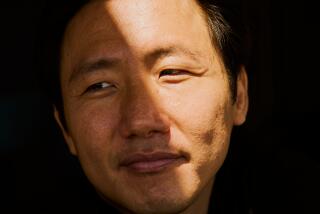The Soul-Searcher
- Share via
Some plays are born great, some achieve greatness, and some have greatness thrust upon them. The last is what has happened to J.B. Priestley’s 1945 “An Inspector Calls,” a chilling morality tale masquerading as a detective story, now in the hands of British director Stephen Daldry.
This brilliant production, a sensation when first staged in London in 1993 and again on Broadway the following year, opened Thursday night at the Ahmanson Theatre. Using an unabashedly overstated interpretation, Daldry and set designer Ian MacNeil rip into the play. They shake the dust off of a clever piece of work that at the end of the day is still a bit repetitive and obvious.
“An Inspector Calls” opens on a celebration--an engagement party at the Yorkshire home of the smug and prosperous industrialist Arthur Birling (Stacy Keach) and his jewel-bedecked, indignant wife, Sybil (Susan Kellermann). Their daughter Sheila (Jane Fleiss) is affianced to Gerald Croft (David Andrew Macdonald), a haughty young old-money aristocrat. Also in attendance is Sheila’s brother Eric Birling (Harry Carnahan), a weak-willed young man unsuccessfully trying to drink away fear of his tyrannical father.
Through bright windows we listen to and partially see their merry glass-clinking: They sit inside a truncated-looking house, which, we can spy, is ornately chandeliered and molded and probably very nice. Outside, however, the rest of the stage is a scene of devastation.
The cobblestone street is ripped up, as if by a bomb, and a red phone booth looks partially melted. Deprived-looking street children inhabit the darkness. So does Edna (Kaye Kingston), the Birling’s fabulously ignored servant. In the distance, we can see a neighboring manor, which is obviously just a little cut-out house--MacNeil plays with the traditional method for showing distance. This blend of the playful and ominous is perfect for the tone of the piece, which is melodramatic but farcical, underlined by an apocalyptic seriousness. Stephen Warbeck’s lushly melodramatic music and Rick Fisher’s lighting lend thick atmosphere and dark tone.
Daldry and MacNeil make exquisite physical delineation of outside and inside, of a life of privilege and one of terrifying vulnerability. The startlingly thin line between the two worlds, both physical and psychological, pays off with the arrival of Inspector Goole (Kenneth Cranham), who has come ostensibly to investigate the grisly suicide of a young woman named Eva Smith. Everyone at this merry celebration, it turns out, has had a hand in ruining this promising young woman’s life.
The excellent Jane Fleiss is especially commanding as the pampered Sheila, the single person compelled to wrestle with the consequences of her actions. As her brother, Harry Carnahan is also fine; the nervous laughter that thinly covers his self-loathing is chillingly credible. Kenneth Cranham, who played the inspector in London and New York, has a Humphrey Bogart-like toughness combined with an excitable moral passion. As the patriarch, Stacy Keach offers a nice strutting blend of solidity and vainglory. As his wife, Susan, Kellermann forces her character’s indefensible high-handedness. In the non-speaking part of the maid, Kaye Kingston’s pleased and horrified and sometimes enigmatic reactions to the family’s plight add an important dimension to the morality tale at hand.
*
Once the inspector leaves, the family must sort out its individual and collective responsibility to Eva Smith, whom some of them hardly knew at all. Priestley throws in a plot twist that Rod Serling must have studied, and one that treats time and reality with Escher-like consideration.
The play is set in 1912, although it was written in the ‘40s and is branded by a post-World War II loss of innocence, just as the set evokes a post air-raid London. The alarming message about personal responsibility that the inspector comes bearing is a message from the future--the play is Priestley’s attempt to warn the past about the future. Daldry clearly evokes World War II, he supplies a crowd of people in 1940s dress--12 to be exact--to observe the family’s moral thrashings. They are a jury of refugees from Priestley’s own time, standing mutely by but watching--and understanding.
The presence of the mute jury eerily reinforces the theme of the play: that our actions have consequences far into the future, that even unwitnessed cruelties are witnessed, eventually. And, to borrow the melodramatic tone of the play: Who among us would be blameless if, in our lives, an Inspector Goole should come to call?
* “An Inspector Calls,” Ahmanson Theatre, 135 N. Grand Ave., Tuesdays-Saturdays, 8 p.m.; Saturdays-Sundays, 2 p.m. Also May 19, 26, June 2, 9, 7 p.m.; Thursday matinees June 13, 20, 27, 2 p.m. Ends June 30. $15-$50. (213) 365-3500, (714) 740-2000. Running time: 2 hours.
(BEGIN TEXT OF INFOBOX / INFOGRAPHIC)
Susan Kellermann: Sybil Birling
Kaye Kingston: Edna
Stacy Keach: Arthur Birling
David Andrew Macdonald: Gerald Croft
Jane Fleiss: Sheila Birling
Harry Carnahan: Eric Birling
Kenneth Cranham: Inspector Goole
Zachary Freed: Boy
Center Theatre Group/Ahmanson Theatre, Noel Pearson, The Shubert Organization and Capital Cities/ABC in association with Joseph Harris present a Royal National Theatre production. By J.B. Priestley. Directed by Stephen Daldry. Sets Ian MacNeil. Lighting Rick Fisher. Music Stephen Warbeck. Sound T. Richard Fitzgerald. Special Effects Gregory Meek. Fight director B.H. Barry. Production stage manager Susie Cordon.
More to Read
The biggest entertainment stories
Get our big stories about Hollywood, film, television, music, arts, culture and more right in your inbox as soon as they publish.
You may occasionally receive promotional content from the Los Angeles Times.










